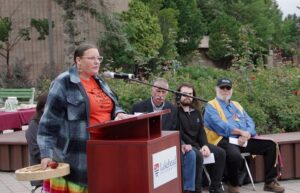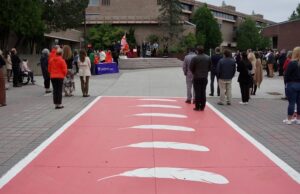Lakehead University commits to walking the path of truth and reconciliation, holds flag-raising ceremony
Trigger warning: readers may be triggered by the mention of Indian Residential Schools. To access a 24-hour National Crisis Line, call: 1-866-925-4419. Community Assistance Program (CAP) can be accessed for citizens of the Anishinabek Nation: 1-800-663-1142

By Rick Garrick
THUNDER BAY — Lakehead University held a National Truth and Reconciliation Flag Raising ceremony on Sept. 7 at the Agora Circle on the Thunder Bay campus.
“Today, we are here to honour the children who did not make it home, those who have passed on, and to the Survivors that are still here with us today,” says Fort William Councillor Bess Legarde. “As a leader on behalf of Fort William, I would like to acknowledge Lakehead University’s effort in this step towards reconciliation. I look forward to seeing more future plans and more things to come. I believe that reconciliation is super important to everyone living and residing in Turtle Island — what happened to our people is something that still affects us today.”
Legarde added that she wanted to remember her grandfather, who was taken from his family at the age of four, survived Indian Residential School and is now in the Spirit World, before she opened the flag raising ceremony with a hand drum song.
“He spent many years there (in Residential School) until he was about 15 and he ran away,” Legarde says. “The effects that it has on our family of intergenerational trauma is that it now affects our ability to learn the basic things of providing love to one another and (the Anishinabek teachings) that they did not experience in Residential School. The main thing is the language that my family has lost.”
Legarde says her grandfather endured physical, emotional, and mental abuse in Indian Residential School.
“It was very hard for him to share about it, but he had shared this and it just breaks my heart every time,” Legarde says.
Gillian Siddall, president and vice-chancellor at Lakehead University, says she is proud to be part of an institution that is continuing to address reconciliation.
“Thank you for joining us today as we come together to honour the Survivors of Residential and Day Schools, their families, communities, and nations,” Siddall says. “Welcome to members of our university community and a special welcome to guests who are honouring us today with their presence, the Survivors and intergenerational Survivors of Residential and Day Schools. We have chosen to gather together today solemnly so we can raise the National Centre for Truth and Reconciliation’s Survivors’ Flag together.”

Siddall says the National Centre for Truth and Reconciliation’s Survivors’ Flag is more than an expression of remembrance.
“It represents a way for everyone to deeply reflect and honour Survivors of Residential Schools and all the lives and Indigenous nations impacted by the Residential [School] System,” Siddall says. “Each element depicted on this flag was directly curated by Survivors from across Canada who were consulted throughout the flag’s creation. Every Indigenous nation is represented here, individual First Nations, the Inuit, and the Métis, and every symbol of representation was carefully chosen to reflect their cultures.”
Siddall adds that the Every Child Matters Pathway located near the Agora Circle represents Lakehead University’s recognition of the harm done to Indigenous children.
“And it will remind us every day how vigilant we must all continue to be to help ensure no child will ever experience the harm Indian Residential [Schools] inflicted or to repeat the profound hurt of having their families, their identities, their language, and their nations taken from them,” Siddall says. “Today, Survivors, their children, and their grandchildren are walking the path of healing. Lakehead has committed to walking the path of truth and reconciliation alongside them. This flag and pathway will be our constant reminder that every child matters.”
Lakehead University is also planning to host a variety of public events leading up to the National Day for Truth and Reconciliation on Sept. 30, including a community-based art project by Fort William artist Ryan Pooman where participants can share what reconciliation means to them on Sept. 11, 18, and 25, a Tipi Talk with Fort William Elder Sheila Decorte on Sept. 13, and a virtual talk over Zoom by Chippewas of Georgina Island First Nation’s Cynthia Wesley-Esquimaux, Chair on Truth and Reconciliation at Lakehead University, discussing if universities are meeting the challenge of reconciliation on Sept. 28.

